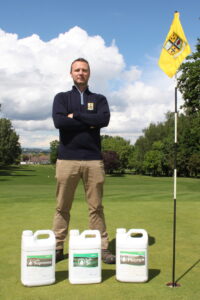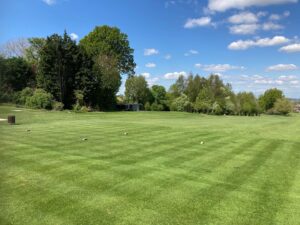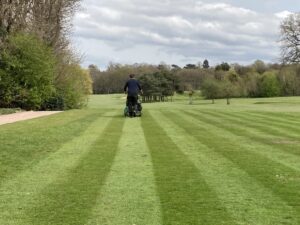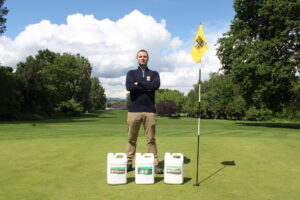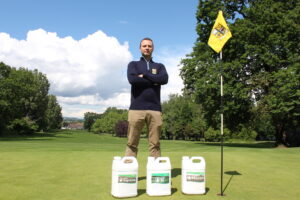Meet the course manager: Michael Budd
Related Articles
The new course manager at Shirley Park Golf Club in Croydon details the changes the club is going through that should result in it reaching even higher levels within the next five years.
A few weeks into his new role as course manager at Shirley Park Golf Club in Croydon, Michael Budd is already integral to the club’s future plans and making positive changes to help the club achieve its ambition of being ready to host a tournament within five years. He talked to us about moving from working in lawn treatment to greenkeeping, positive management strategies, and putting turf and plant nutrition products to the test.
Could you tell us about your background and how you became course manager at Shirley Park GC?
I got into turf when I was about 21, and got a job maintaining school grounds with a local contractor in Eltham, south east London. Then I went into other groundsman jobs on bowling greens, pitch marking for sports and athletics, lawn mowing and tractor driving, for everything but golf. When I was about 24 I took the step of paying for my own spraying certificate because I wanted to open the door to more work and I met some guys who worked for the lawn treatment company, Green Thumb. They had their own vans and mobile phones and I thought that was something I might like to do.
I went into lawn treatment for about five years, for three different franchises in different parts of the country and absolutely loved it. The customer service aspect and listening to customers’ needs really appealed to me. I got a reputation for being someone who would really spend time with a customer, passing on knowledge about the products. It gives me a kick to please the customers.
I moved back to Essex from the Midlands and decided to ask for a job at the golf course my parents’ house backed onto because I’d always fancied the stripes on the course. I got taken on there and that was my first job in golf, but the club quickly went into administration. Then I moved to an Altonwood club, Westerham, in Surrey in about 2014 and climbed through the ranks to first assistant within a year, then was promoted to deputy in another year. I got my NVQs and my boom spraying licence, and my ethos was to work so hard I’d make them feel guilty if they didn’t promote me. My manager there, Andy Royall, harnessed my enthusiasm. It was a bit irregular for someone in our group to go up to Harrogate for the BTME exhibition and go to seminars, but he realised that if he didn’t make the most of my enthusiasm for the education side of things I would move on to somewhere that did.
I’m grateful to him for the support and everything that he taught me. I did the Toro Student Greenkeeper of the Year award in 2017 and made it to the final six and that opened up a few more doors. Then I applied for FTMI (Future Turf Managers Initiative) in 2018 with BIGGA, and was selected as one of 20 for that, and that gave me my management skills. I was always dead set as soon as I got my promotion to first assistant that this was my career now rather than just a job. I was determined to be a manager, maximise all my licences, all my education, and see how far I could push this. It just ignited my passion. I got promoted to head greenkeeper at Woldingham GC, and after a year there I took a job as course manager of Richmond Park GC, where they have 36 holes.
That gave me the experience of a full budget and a lot of HR and paperwork duties. I took the job so I could learn the A-Z of greenkeeping, and because of the budget I could undertake things like drainage projects and pathway construction with a team of eight to 10. It was a well-paid job and gave me some great project management and construction experience, but being so office-based did make me lose my passion and enthusiasm. That kind of role is not suited to everyone. So I made the move to Shirley Park in Croydon, which is a private members’ golf club and I feel it’s a proper chance to shine.
What size is your team and how do you share the workload between you?
We have grown the team from four to six staff now which is allowing us to get the basics right and better management practices. With a larger team we can work on projects in-house and with contractors taking on projects like having our bunkers lined. When we recruited for a deputy we were looking for someone ambitious who would take on their own managerial role in three to five years.
Empowering the deputy and the team as a whole is key to my role here. I’ve been giving everyone in the team more responsibility so they can learn and be self-sufficient. My management style is transparent and honest and my ethos is ‘plan, drive and deliver’. Whenever I take on a new team or staff member I always give them an appraisal within the first month and I will help them to meet every goal they have, as long as they fulfil my golden list, which includes things like quality over quantity, honesty, enthusiasm, clear communication and feedback.
I actually like being challenged by my team because it pushes me out of my comfort zone and shows me they’ve got something about them. There is a hierarchy and I am their manager but I don’t want them to think they can’t approach me and make criticisms if necessary. Someone I worked with at Richmond Park GC is now coming to join the team because he wants to work with me again, which is great.
What do you think attracts members to the club and what plans does Shirley Park have for the future?
Membership increased during the pandemic by default but it’s a little early on in my time here for me to say what attracts them to this club in particular. What I can say is that there is a new general manager here and there’s a new board who are invested in the future plans and want to see them through. The new general manager is also dedicated to the same vision and wants me, as course manager, to drive it all through. I think things are going to be more performance-driven now and the right attitude and direction will be rewarded. It’s nice to have a general manager that I really trust and we share an honest approach to feedback. So the attraction for members at the moment is probably what lies on the horizon and the changes they can see happening. We’ve now got a board, a general manager, a new course manager and a pro that are all driving the same vision, which is that in the next five years we want to host a tournament again.
Which aspects of the job appeal to you most?
I love training and building teams and sharing my passion and enthusiasm with those teams. I love taking something that’s good and making it even better, so improving a course rather than just maintaining it. Also I get a kick out of delivering customer satisfaction to the members and giving them a course they can be proud to be part of.
What has been your proudest achievement in the job so far?
It’s early days at Shirley Park but I think seeing the differences being made within the first month, for example extending approaches to the greens and improving the appearance of the turf. I was also able to create a spreadsheet with available resource hours of the team, versus resource hours of the tasks and put it to the board that we needed two extra staff, which they easily agreed. Using data to prove that we needed more staff has been really useful and has taken the pressure off my team, and that’s an achievement in a short space of time.
You’re working with Aquatrols and have been using the Redox range of products. Which ones are you using and what problems have they helped you solve?
At the moment I’m using TurfRx Si, TurfRx Supreme and TurfRx K+, which as a trio I call the ‘tournament package’. The TurfRx K+ is great when you’re preparing for a tournament and you’re upping the mowing, the rolling and pushing the greens harder. You’ve got potassium for stress relief and it’s also good in hot weather. The TurfRx Si, which is silicon, stands the grass up on end for a faster ball roll. It works so well I once pulled up to a green, got off my mower, and had to stroke the surface where it had been treated because the grass looked like it had been electrified. The TurfRx Supreme provides some important nutrients, so altogether it’s a fantastic tournament package.
How else does including Redox in your programme benefit you and the club?
When I first started using the products I put them to the test by photographing the green every day in the same spot, and compared the photographs to see if they really did what they said on the tin, and as a result I bought into that trio of products because they worked for me. I also use the Aquatrols’ wetting agent range for the same reasons as it also offers flexibility with the rate that you can apply it at. At a previous club I treated some tees that were brown and burnt with it. I applied the wetting agent, only watered it once, and after a week it was like a miracle cure. I’ve still got the photos.
How do members respond to the results of the Redox programme?
I think it makes a huge difference and it certainly gets noticed. I’ll always hold onto what works for me, and even though every surface is different I’m sure the products will deliver as they have done at the two previous clubs where I’ve used them. I also use Redox’s NatureCur and OxyCal, which I’ve found are excellent at eradicating disease scars, so I’ll be using that before a forthcoming event too. I’m a complete believer in the range.
What have you been focusing on and what other projects have you got planned for this year?
My goal is to have the course tournament-ready within five years. Feedback from the members has been very good but I expect it to get even better in the next few weeks because we’re ramping the mowing regime up to present the course to a higher standard and we’re doing lots of little detail jobs. For instance, we’re hand-watering small brown areas on the tees, as well as hand-watering the tees. We’re trimming around all the irrigation boxes and even doing some small projects like opening up walkways to tees by lifting the tree canopies off them so there’s a bit more light. I’ve been showing the team how to flat rake which is new for them and presents the bunkers in a nicer style. We’re also rolling three times a week now, just to get the greens faster. We’re doing a lot of work to get the surface truer and faster. I’m searching for perfection.
For the winter we’re planning a lot of tree work. We’ve got three people here with chainsaw licences, including me, so we’ll be doing extensive woodland management. We hope to have approach irrigation installed and three new tees built. Our greens chairman, Steve Denham, is a builder by trade and has already built us three new tees in less than a week. They look premium, so I have asked him to build us some more later in the year.
What do you think could be done to attract new greenkeepers to the profession and what advice would you give to anyone starting out in greenkeeping now?
I think the recruitment problem is caused by a combination of low salaries, which are a big topic at the moment, but also how the profession is talked about by management. I go into schools myself on careers’ fair days and speak to pupils to try to attract them to the industry at a young age. I think we, as managers, should be sending more positive words out there, rather than spreading negativity. If the industry seems negative about greenkeeping, why would a new greenkeeper stay in it?
Let’s talk about the good things that greenkeeping brings: the nature, the ecology, the chance to work outside, the chance to gain formal qualifications while you work, the chance to travel abroad with it, the chance to work at high level clubs, local clubs, corporate clubs, and volunteer work at big televised tournaments. I’ve been selected to work at the 150th Open at St Andrews in July, so hopefully my team can see how exciting the opportunities are. I hope next year to support one of them to apply to work at the Open because I want to create a circle of positivity and encouragement. We need to let people know about all the positive and exciting opportunities greenkeeping can bring. It won’t solve the recruitment crisis but it can only help.
To anyone starting out now I’d say to try as many different clubs as you can in your early career to find out what you like. I would advise not to listen to negativity and to stand on your own two feet and pursue what you want. Have a goal in sight and focus on that. Just keep pushing forwards.

